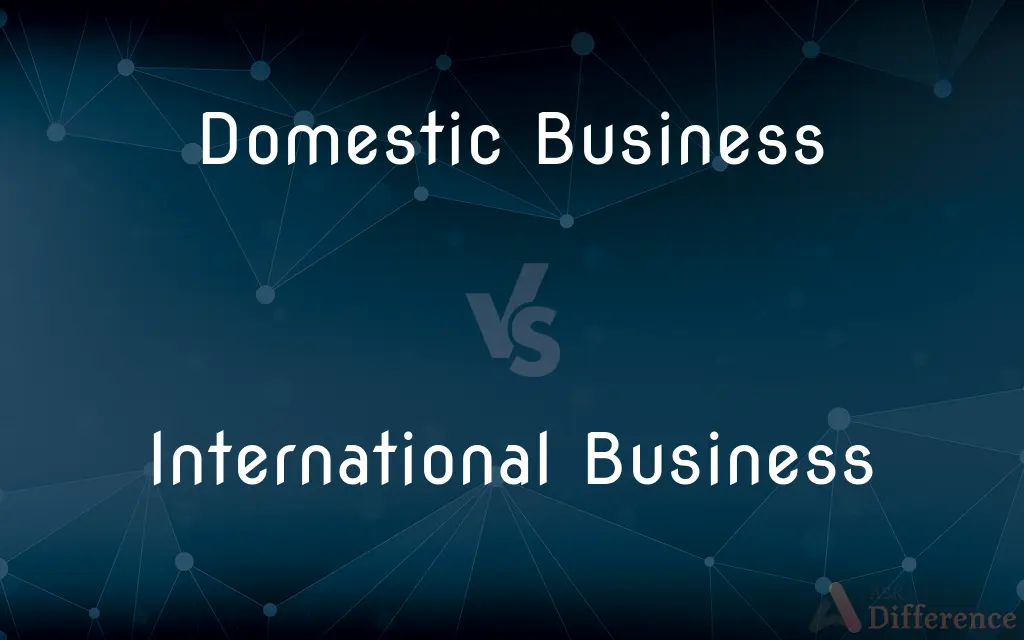Domestic Business vs. International Business — What's the Difference?
By Tayyaba Rehman — Published on December 25, 2023
Domestic Business operates within a single country's borders, focusing on local markets. International Business transcends national boundaries, dealing with multiple countries and diverse markets.

Difference Between Domestic Business and International Business
Table of Contents
ADVERTISEMENT
Key Differences
Domestic Business and International Business are distinct in their scope, operations, and challenges. While both are critical components of a country's economy, they operate on different scales and face varied market dynamics.
Domestic Business typically focuses on serving the local market within a single country. This means it understands and caters to a more homogenous set of customers, regulations, and business environments. On the other hand, International Business deals with trading and transactions that span across different countries, necessitating an understanding of diverse cultures, laws, and market behaviors.
In terms of competition, Domestic Business usually contends with local competitors. The competition can be intense, but it's mostly confined to entities within the same nation. Conversely, International Business faces global competition, where companies from different nations vie for market share in multiple regions.
Currency is another distinguishing factor. Domestic Business generally deals in a single currency, which shields it from foreign exchange risks. In contrast, International Business encounters multiple currencies, exposing it to currency fluctuation risks.
Lastly, regulatory environments play a significant role. While Domestic Business adheres to local laws and regulations, International Business must navigate and comply with the regulations of each country it operates in, making its operational landscape more complex.
ADVERTISEMENT
Comparison Chart
Geographical Operation
Operates within a single country
Operates across multiple countries
Market Understanding
Understands local market and culture
Must understand diverse markets and cultures
Currency Risk
Limited, deals in one currency
Exposed to currency fluctuations
Regulatory Environment
Follows local regulations
Must comply with multiple countries' regulations
Competition Landscape
Local competition
Faces competition on a global scale
Compare with Definitions
Domestic Business
Business dealings exclusive to one's own country.
Despite global trends, they chose to focus solely on Domestic Business.
International Business
Commercial dealings that cross national borders.
Their International Business division manages trade across Europe and Asia.
Domestic Business
Commercial pursuits that cater solely to local markets.
They believed their product suited Domestic Business more than international markets.
International Business
Operations and trade that are global in scope.
Engaging in International Business exposed them to new market opportunities.
Domestic Business
Transactions and operations restricted within national boundaries.
Their Domestic Business flourished due to their understanding of local demands.
International Business
Business activities that operate in multiple countries.
Diversifying into International Business helped them hedge against local economic downturns.
Domestic Business
A company's trade and operations confined to its home country.
Their Domestic Business strategy revolves around catering to local tastes.
International Business
Economic engagements beyond one's home country.
Their success in International Business was evident in their global brand presence.
Domestic Business
Economic activities serving a single nation's market.
The company expanded its Domestic Business by opening more stores nationwide.
International Business
Transactions that span across different nations and markets.
They hired experts in International Business to navigate complex global regulations.
Common Curiosities
Does Domestic Business face currency fluctuation risks?
Generally, Domestic Business deals in one currency and has limited exposure to currency fluctuation risks.
How does International Business differ in scope from Domestic Business?
International Business operates across multiple countries, dealing with diverse markets, while Domestic Business is confined to one nation.
How complex is the regulatory landscape for International Business?
International Business must navigate and comply with regulations of each country it operates in, making it more complex.
Do International Businesses always have physical presences in multiple countries?
No, International Business can also involve exports, online sales, or partnerships without having a physical presence everywhere.
What challenges might International Business face compared to Domestic Business?
International Business may face challenges like diverse cultural nuances, multiple regulations, currency risks, and global competition.
Is Domestic Business typically smaller in scale?
Not necessarily. Some Domestic Businesses can be substantial, but their operations are confined to their home country.
Can Domestic Businesses be affected by international events?
Yes, global economic events, supply chain disruptions, or international policies can impact Domestic Businesses.
What is the primary focus of Domestic Business?
Domestic Business primarily focuses on serving the local market within its home country.
Can a company operate both as a Domestic Business and International Business?
Yes, many companies have both domestic operations and international divisions or branches.
How does competition differ for Domestic Business vs. International Business?
Domestic Business faces local competitors, while International Business competes on a global scale against companies from various nations.
What drives companies to expand into International Business?
Companies might pursue International Business for market diversification, growth opportunities, tapping new customer bases, or accessing resources.
Is it riskier to engage in International Business?
International Business has unique risks like currency fluctuations and geopolitical issues, but it can also offer diversification benefits.
Is understanding cultural nuances more critical in International Business?
Absolutely. Cultural understanding is vital in International Business to cater to diverse markets effectively.
Are there benefits to focusing solely on Domestic Business?
Yes, focusing on Domestic Business allows for a deeper understanding of local markets and can reduce exposure to international risks.
Which business type is more exposed to geopolitical risks?
International Business is more exposed to geopolitical risks due to its operations across multiple nations.
Share Your Discovery

Previous Comparison
Chi Silk Infusion vs. Biosilk
Next Comparison
Natron vs. Baking SodaAuthor Spotlight
Written by
Tayyaba RehmanTayyaba Rehman is a distinguished writer, currently serving as a primary contributor to askdifference.com. As a researcher in semantics and etymology, Tayyaba's passion for the complexity of languages and their distinctions has found a perfect home on the platform. Tayyaba delves into the intricacies of language, distinguishing between commonly confused words and phrases, thereby providing clarity for readers worldwide.
















































